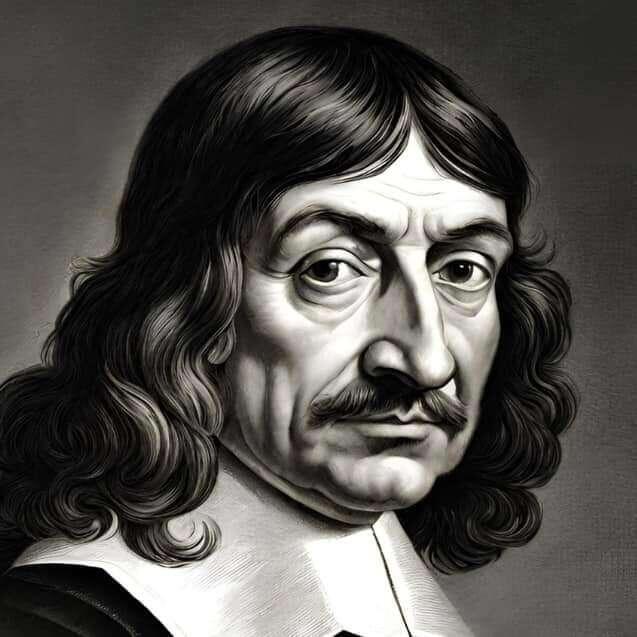Anarko on Nostr: 🌊 SURF 'N TURF 🏝️ -THE ISLAND LIFE- The Underrated Genius of René Descartes ...
🌊 SURF 'N TURF 🏝️
-THE ISLAND LIFE-
The Underrated Genius of René Descartes
Is the genius of René Descartes is underrated?
Although René Descartes (1596–1650) is often acknowledged for his famous phrases and contributions to Cartesian geometry, the breadth of his influence is frequently underestimated. His work fundamentally shifted how we view knowledge, inquiry, and even the nature of existence. In this sense, he is an underrated genius whose visionary ideas are woven through multiple disciplines—sometimes so deeply embedded that they’re overlooked. He made groundbreaking contributions across multiple fields, including philosophy, mathematics, and science.
Here’s an overview of some of his most influential contributions:
1. Philosophy: Cogito, Ergo Sum (“I Think, Therefore I Am”)
• Descartes’ most famous philosophical assertion, “Cogito, ergo sum,” was a foundational moment in Western thought. In his search for certainty, he arrived at the realization that while he could doubt everything, he could not doubt his own act of doubting, and thus, his existence. This insight established a basis for self-awareness and individual consciousness as fundamental truths.
• His method of methodological skepticism—doubting everything that could not be proven with absolute certainty—helped shape modern approaches to scientific inquiry and knowledge.
2. Dualism: Mind-Body Separation
• Descartes developed the concept of dualism, which posits that mind and body are fundamentally different substances. According to Descartes, the mind (a non-material substance) is separate from the body (a material substance), and they interact through the pineal gland. This idea had a profound influence on philosophy, psychology, and neuroscience, sparking debates that continue today about the nature of consciousness and the relationship between the mental and physical worlds.
3. Analytical Geometry
• In mathematics, Descartes’ analytical geometry revolutionized the field. He introduced a way to describe geometry through algebra by plotting points on a Cartesian coordinate system (named after him). This innovation allowed geometric shapes to be expressed as algebraic equations and enabled the development of calculus by Newton and Leibniz.
• The Cartesian plane (using x and y coordinates) remains fundamental to mathematics and physics, linking algebra and geometry and providing a basis for graphing functions and data.
4. Cartesian Doubt and Rationalism
• Descartes is often considered the father of rationalism, a philosophical view that emphasizes reason as the primary source of knowledge. His systematic doubt and emphasis on deductive reasoning laid the groundwork for the scientific method, influencing Enlightenment thinkers and shaping the development of Western philosophy.
5. Scientific Contributions and Mechanics
• Descartes made strides in optics, explaining the law of refraction (now known as Snell’s law) and advancing theories about light and vision. His work contributed to the early understanding of how light behaves, helping to bridge the gap between physics and philosophy.
• In mechanics, he proposed that the physical world operated according to certain mechanical laws, laying a foundation for classical physics. Though later revised by Newton, Descartes’ ideas were essential to early conceptions of motion and the mechanistic view of nature.
6. Mathematical and Scientific Terminology
• Descartes introduced terms and conventions still in use today. For instance, he used superscript numbers to denote exponents (e.g., x^2 for x squared), which is now standard in algebra.
• He also introduced the use of letters at the end of the alphabet to represent unknowns (e.g., x, y, z) and letters at the beginning to represent constants (a, b, c), conventions that remain essential in algebra.
7. Influence on Medicine and Neuroscience
• Though not entirely accurate by modern standards, Descartes’ ideas on the interaction between mind and body contributed to early studies in neuroscience and psychology. His view that the mind affects the body through the pineal gland was one of the first attempts to explain brain function, stimulating later research into the physiological basis of thought and behavior.
Summary
Descartes’ work in philosophy, mathematics, and science makes him the grandfather of modern thought, emphasizing skepticism, analytical reasoning, and the pursuit of knowledge through rational inquiry. His legacy endures in fields ranging from mathematics and computer science to philosophy and cognitive science, making him a pivotal figure in the development of Western intellectual history.

Credits Goes to the respective
Author ✍️/ Photographer📸
🐇 🕳️
#Bitcoin #Satoshis #Freedom #Apocalypse #Music #Movies #Philosophy #Literature
